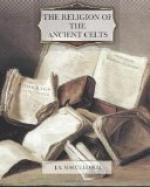[566] Sebillot, i. 9, 35, 75, 247, etc.
[567] Joyce, SH ii. 273; Cormac, 87; Stokes, TIG xxxiii., RC xv. 307.
[568] Miss Hull, 170, 187, 193; IT i. 214; Leahy, i. 126.
[569] IT i. 287.
[570] Henderson, Irish Texts, ii. 210.
[571] Capit. Karoli Magni, i. 62; Leges Luitprand. ii. 38; Canon 23, 2nd Coun. of Arles, Hefele, Councils, iii. 471; D’Achery, v. 215. Some of these attacks were made against Teutonic superstitions, but similar superstitions existed among the Celts.
[572] See Grimm, Teut. Myth. ii. 498.
[573] A more tolerant note is heard, e.g., in an Irish text which says that the spirits which appeared of old were divine ministrants not demoniacal, while angels helped the ancients because they followed natural truth. “Cormac’s Sword,” IT iii. 220-221. Cf. p. 152, supra.
[574] Caesar, vi. 18; Pliny xxii. 14. Pliny speaks of culling mistletoe on the sixth day of the moon, which is to them the beginning of months and years (sexta luna, quae principia, etc.). This seems to make the sixth, not the first, day of the moon that from which the calculation was made. But the meaning is that mistletoe was culled on the sixth day of the moon, and that the moon was that by which months and years were measured. Luna, not sexta luna, is in apposition with quae. Traces of the method of counting by nights or by the moon survive locally in France, and the usage is frequent in Irish and Welsh literature. See my article “Calendar” (Celtic) in Hastings’ Encyclop. of Religion and Ethics, iii. 78 f.
[575] Delocke, “La Procession dite La Lunade,” RC ix. 425.
[576] Monnier, 174, 222; Fitzgerald, RC iv. 189.
[577] Frazer, Golden Bough{2}, ii. 154 f.
[578] Pliny, xvi. 45; Johnson, Journey, 183; Ramsay, Scotland in the Eighteenth Century, ii. 449; Sebillot, i. 41 f.; MacCulloch, Misty Isle of Skye, 236. In Brittany it is thought that girls may conceive by the moon’s power (RC iii. 452).
[579] Strabo, iii. 4. 16.
[580] Brand, s.v. “New Year’s Day.”
[581] Chambers, Popular Rhymes, 35; Sebillot, i. 46, 57 f.
[582] Polybius, v. 78; Vita S. Eligii, ii. 15.
[583] Osborne, Advice to his Son (1656), 79; RC xx. 419, 428.
[584] Aristotle, Nic. Eth. iii. 77; Eud. Eth. iii. 1. 25; Stobaeus, vii. 40; AElian, xii. 22; Jullian, 54; D’Arbois, vi. 218.
[585] Sebillot, i. 119. The custom of throwing something at a “fairy eddy,” i.e. a dust storm, is well known on Celtic ground and elsewhere.
[586] Folk-Lore, iv. 488; Curtin, HTI 324; Campbell, The Fians, 158. Fian warriors attacked the sea when told it was laughing at them.




